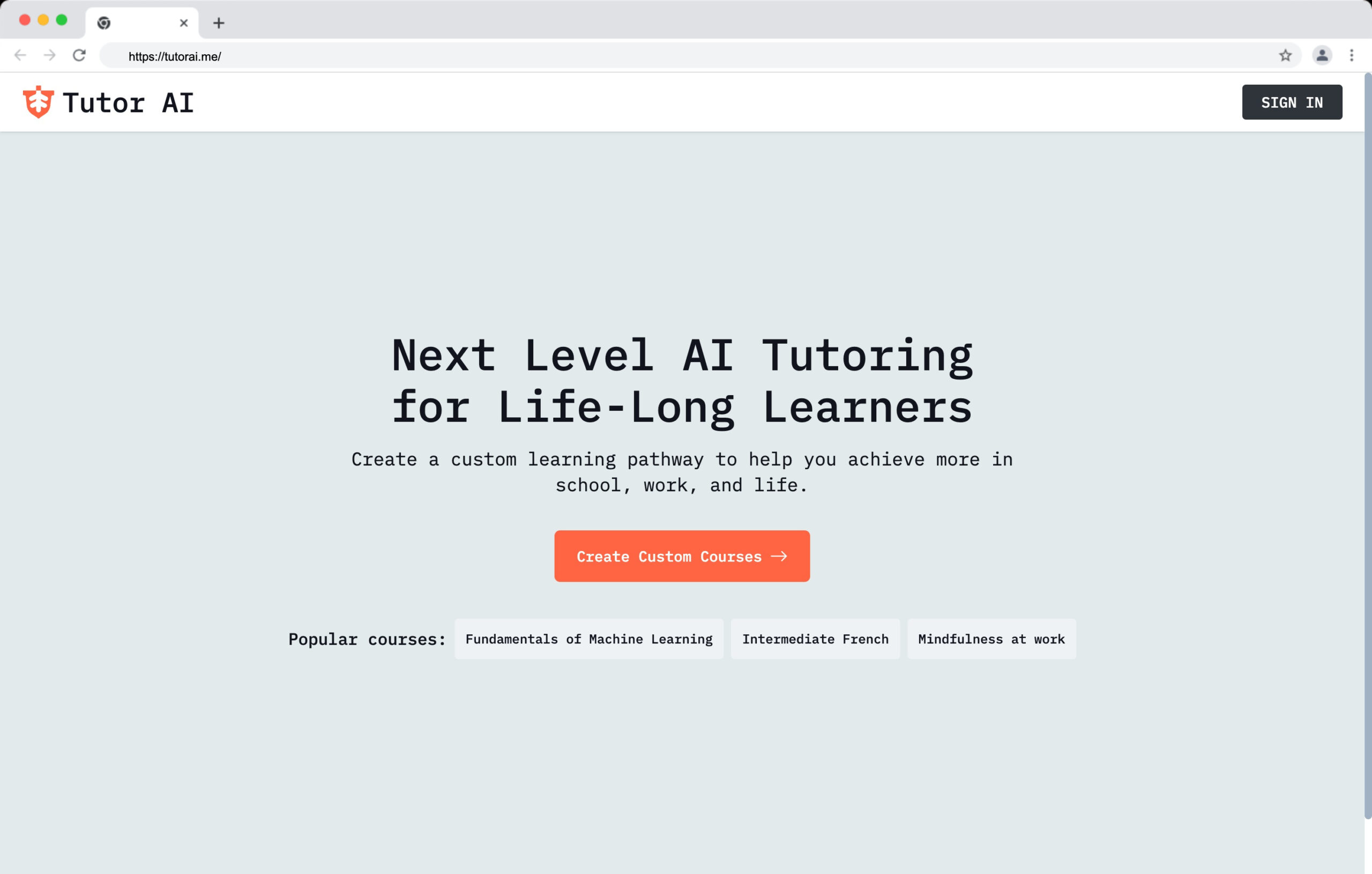When I was in school, everything felt like a time crunch. Between classes, assignments, exams, and trying to stay sane, studying felt more like survival than learning. But that’s changed.
Today, students have access to AI tools that don’t just save time — they actually help you understand what you’re studying, write better, organize smarter, and stay productive without burning out.
If you’re a student looking to stay ahead, or a parent or educator trying to support students with tech that actually works, here’s a detailed breakdown of the best AI tools for students and how each can make studying easier and more effective.
Full Comparison Table of AI Tools for Students
| Tool Name | Category | Input Type / Format | Key Features | Price | Best For |
|---|---|---|---|---|---|
| Socratic AI Math Helper | Math | Typed or uploaded problems | Logic-based step-by-step math explanations | Free | Focused math support, no distractions |
| Photomath | Math | Camera (printed/handwritten) | Visual steps, camera input, supports high school & college math | Free + $9.99/month | Visual learners using textbooks/notebooks |
| Mathway | Math | Typed or calculator input | Advanced math coverage, offline access, multiple solving methods | $9.99/month | Fast answers, college-level math |
| Otter.ai | Note-Taking | Audio | Live transcription, searchable notes, speaker ID | Free + $10/month | Recording lectures and reviewing later |
| Notion AI | Note-Taking | Text | Summarization, flashcard creation, organization within Notion | $10/month | Subject planning, project-based learning |
| Mindgrasp.ai | Note-Taking | Video, PDF, lecture uploads | Summarizes lectures, videos, PDFs; creates quizzes | $9.99/month | Students overloaded with dense material |
| Grammarly | Writing | Text | Grammar, clarity, tone, plagiarism detection | Free + $12/month | Writing papers, polishing assignments |
| Quillbot | Writing | Text | Paraphrasing, grammar check, citation tools | Free + $9.95/month | Rewriting, summarizing, citation help |
| ChatGPT (GPT-4) | Writing / Research | Text / Prompts | Essay structure, brainstorming, plugin access for research | $20/month | Brainstorming and writing assistance |
| Duolingo Max | Language Learning | App-based, text & speech | AI chat, roleplay, grammar explainers | $29.99/month or $167.99/year | Practicing speaking, grammar in context |
| Learn.xyz | Language / Concepts | Voice, text, visuals | Visual + interactive learning, custom lessons | Free basic; paid plans | Beginners and visual learners |
| Perplexity AI | Research | Text prompts | Quick academic summaries with citations | Free + $20/month | Paper planning and idea generation |
| Elicit | Research | Research questions / topics | Pulls peer-reviewed papers, key insights | Free | Deep academic research |
| Scite.ai | Research | Citations and academic queries | Maps research credibility, citation analysis | Free + $20/month | Thesis and high-level academic writing |
| Quizlet AI | Study / Flashcards | Notes or text | Magic Notes converts content to flashcards & quizzes | Free + $35.99/year | Fast exam prep, flashcard automation |
| Anki (with AI plugins) | Study / Flashcards | Manual + AI plugin input | Spaced repetition, plugin-generated cards from PDFs | Free; plugin prices vary | Long-term memory, med/law students |
| Reclaim AI | Productivity | Google Calendar integration | Auto-scheduling, focus time protection, task balancing | Free + $10/month | Students managing tight calendars |
| TimeHero | Productivity | Task + calendar input | Predictive task scheduling, adapts to changes | Starts at $5/month | Students with shifting schedules |
AI Tools for Taking Better Notes
Let’s start with the first thing most students struggle with: note-taking.
We all know the feeling — the lecture moves fast, and before you know it, you’re five slides behind and still trying to write down what the professor said three minutes ago.
AI can help streamline the entire note-taking process.
My top picks for note-taking tools:
1. Otter.ai
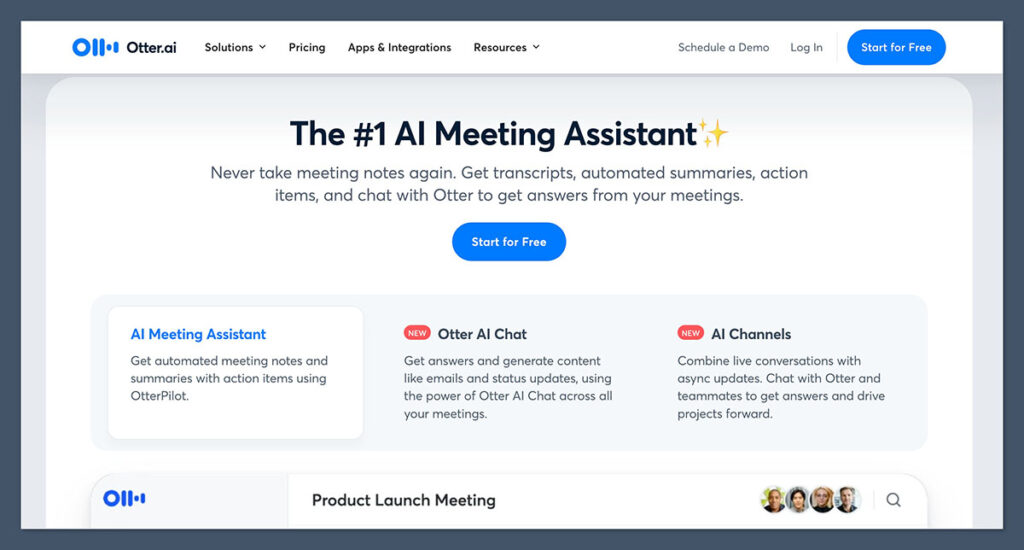
Otter records audio in real time, transcribes it almost instantly, and even highlights keywords as it goes.
Pros:
- Live transcription during lectures
- Easy to search keywords from past notes
- Can share transcripts with classmates
Cons:
- Struggles with heavy accents or background noise
- Not always 100% accurate
- Requires good internet for live sessions
Price: Free tier available; Premium starts at $10/month
If you’re someone who learns better by reviewing later rather than scribbling down everything in real time, Otter is a lifesaver. It’s like having a smart assistant sitting in class with you.
2. Notion AI

If you already use Notion to organize your subjects, adding their AI is a no-brainer.
Pros:
- Converts notes into outlines, summaries, or flashcards
- Integrates with full Notion workspace
- Great for multi-subject planning
Cons:
- Can be overwhelming for new users
- Requires manual prompting for best results
- Might distract from deep focus if misused
Price: Notion Plus Plan with AI features is $10/month
Notion AI shines if you’re juggling different subjects or working on long-term projects. It keeps everything clean and manageable without you having to restructure your notes manually.
3. Mindgrasp.ai
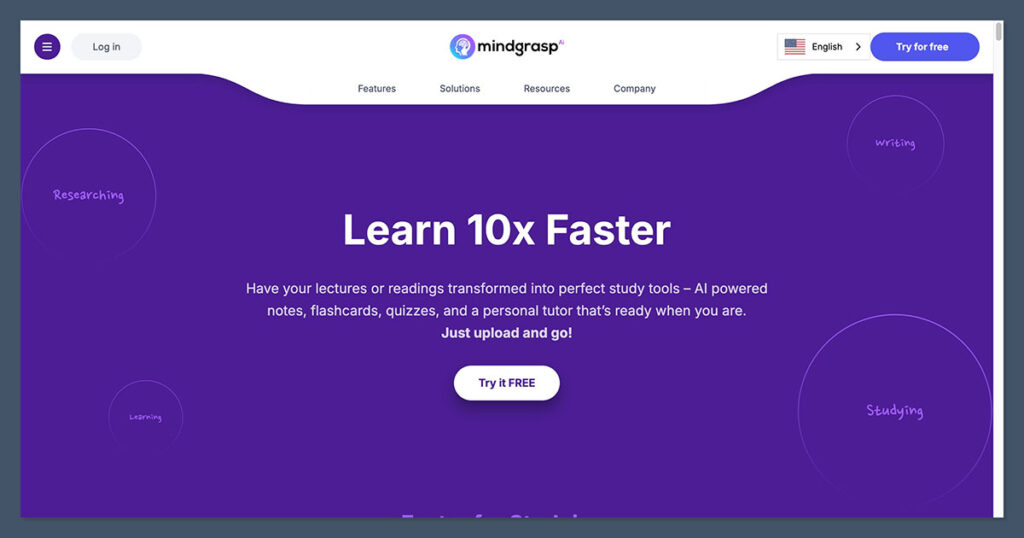
Mindgrasp pulls summaries from videos, PDFs, and notes in seconds.
Pros:
- Handles various input types
- Creates summaries and quiz questions
- Good for heavy content loads
Cons:
- Less accurate with technical or niche topics
- Interface feels busy
- Not mobile-optimized
Price: Starts at $9.99/month
Mindgrasp is great for cutting through reading overload. It saves time and helps with retention when you’re slammed with long content.
AI Tools for Writing and Grammar Help
Writing papers can eat up your time fast. These tools reduce stress and help clean up your work without overdoing it.
Here are the tools that actually make a difference:
1. Grammarly
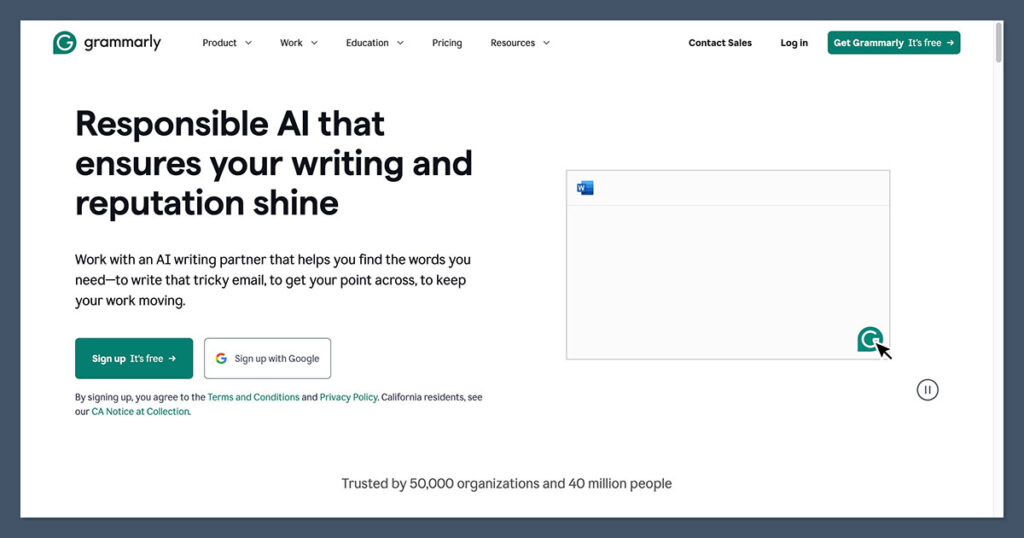
Grammarly gives grammar, clarity, tone, and even plagiarism feedback.
Pros:
- Real-time grammar and tone corrections
- Plagiarism checker included
- Works across multiple platforms
Cons:
- Sometimes overcorrects style choices
- Plagiarism detection isn’t academic-level strict
- Premium is required for advanced features
Price: Free version available; Premium starts at $12/month
Grammarly is a solid everyday writing assistant. Even for strong writers, it saves time cleaning up drafts and avoiding silly mistakes.
2. Quillbot
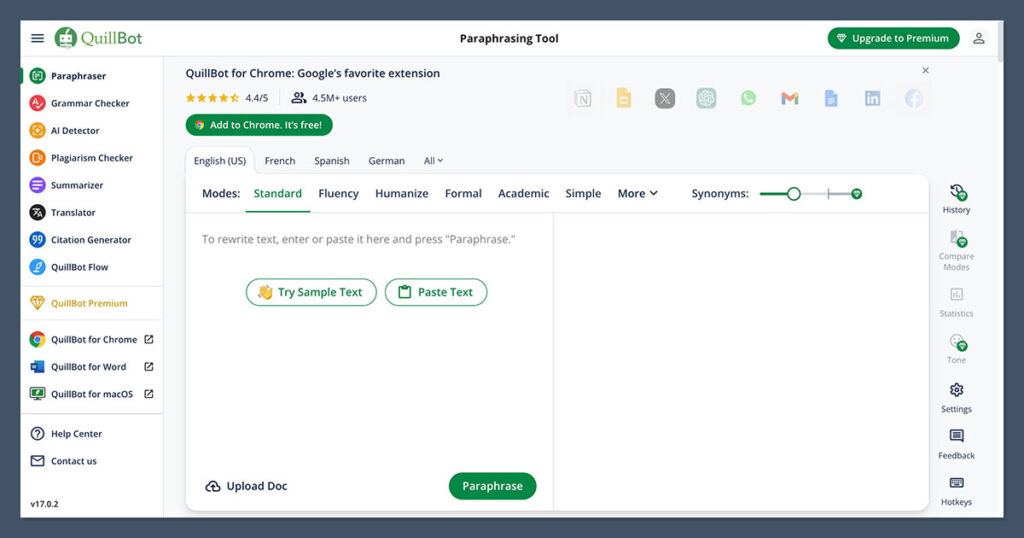
Quillbot is great for paraphrasing and shortening long blocks of text.
Pros:
- Powerful rewording engine
- Built-in citation tool
- Includes grammar and summarizing tools
Cons:
- Rewrites can sound robotic without editing
- Free version has word limits
- Sometimes misses academic tone
Price: Free tier available; Premium starts at $9.95/month
If you’re dealing with citations, rewrites, or tight word counts, Quillbot will make your life easier. Just make sure to proofread the final output.
3. ChatGPT (GPT-4 with Plugins)
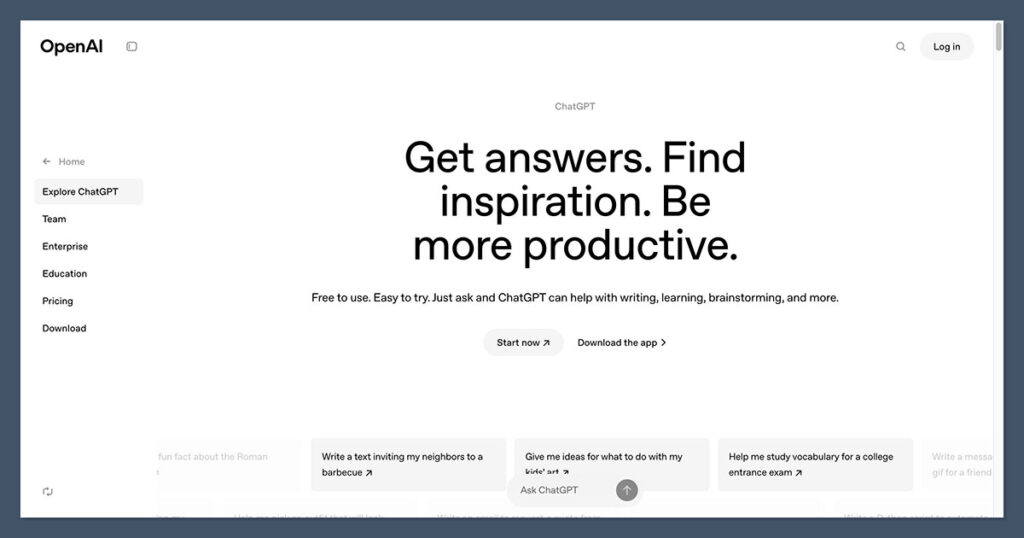
ChatGPT helps brainstorm, write, and even research content with prompts.
Pros:
- Can outline and expand ideas
- Offers structured help for essays
- With plugins, it can cite and research
Cons:
- Can generate vague or repetitive text
- Needs good prompts for strong results
- No live internet access in free version
Price: ChatGPT Plus is $20/month
ChatGPT is like a brainstorming partner. It won’t write your essay for you, but it can save hours by helping you get started or improve structure.
AI Tools for Math Help
These tools don’t just give you answers — they break down the steps so you can actually understand the method, not just memorize the result.
Here are the best AI tools I’ve used (and recommend) for math help:
1. Socratic AI Math Helper
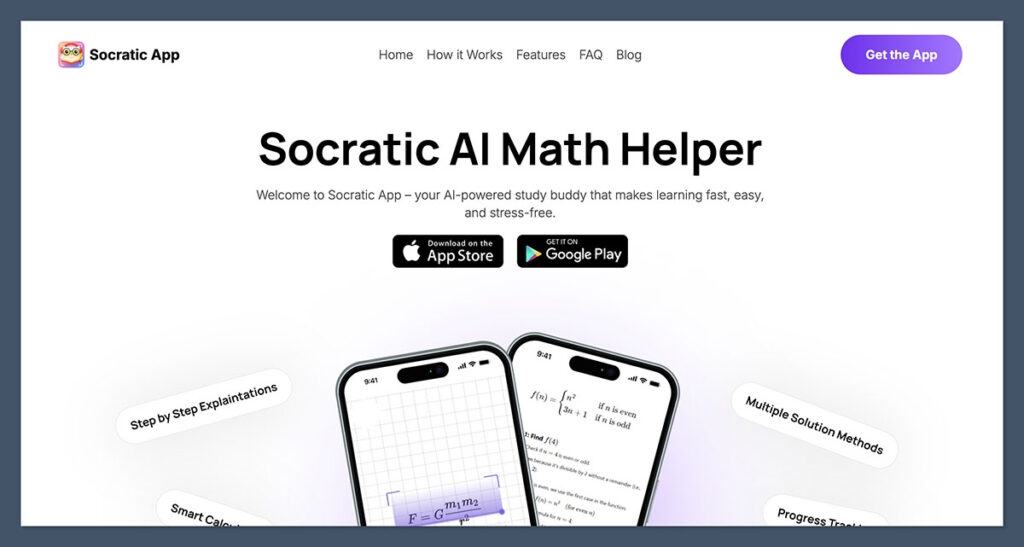
Socratic AI Math Helper is a newer AI-powered tool focused on solving math problems using step-by-step explanations.
You upload or type a problem, and it walks through the full process with AI-generated insights and working logic. It’s designed specifically for math, not general tutoring, so it’s a focused tool for students who want clarity without distractions.
Pros:
- Accurate, logic-based solutions with full steps
- Designed specifically for math (not a general AI chatbot)
- Supports algebra, geometry, calculus, and more
- Clean, mobile-first design
Cons:
- Doesn’t currently support word problems
- Lacks deep customization for learning preferences
- No handwriting scan — typed or uploaded input only
Price: Free version available, pro plans starting at $6.99
If you want a math-only tool that explains every step clearly and isn’t bloated with features you don’t need, Socratic AI Math Helper is a solid choice. It’s fast, clean, and built with students in mind.
Especially helpful for homework, daily practice, or brushing up on forgotten concepts.
2. Photomath

Photomath scans math problems (printed or handwritten) and walks through each step in a clean, visual layout. It’s ideal for visual learners or anyone working straight from their notebook or textbook.
Pros:
- Reads both typed and handwritten problems
- Step-by-step explanations
- Covers wide range of math topics
Cons:
- Struggles with complex or multi-part problems
- Requires camera access
- Some advanced concepts not supported
Price: Free version available; Photomath Plus is $9.99/month
Photomath is a great day-to-day helper. If you prefer working with pen and paper, this lets you stay in that zone while still getting guided support.
3. Mathway

Mathway covers everything from basic algebra to high-level calculus and even linear algebra. You input the problem, and it spits out the solution — fast. If you want the full breakdown of steps, you’ll need the paid version.
Pros:
- Covers a huge range of math topics
- Fast and reliable answers
- Works offline
Cons:
- Step-by-step feature is locked behind paywall
- Interface feels outdated
- Not as good for learning the why behind answers
Price: $9.99/month for full features
Mathway is perfect for checking your work or solving problems under pressure. If you’re already comfortable with math and just need speed, this gets it done.
AI Tools for Language Learning
If you’re studying a new language, these tools make it easier to practice speaking and comprehension in a real-world context.
1. Duolingo Max
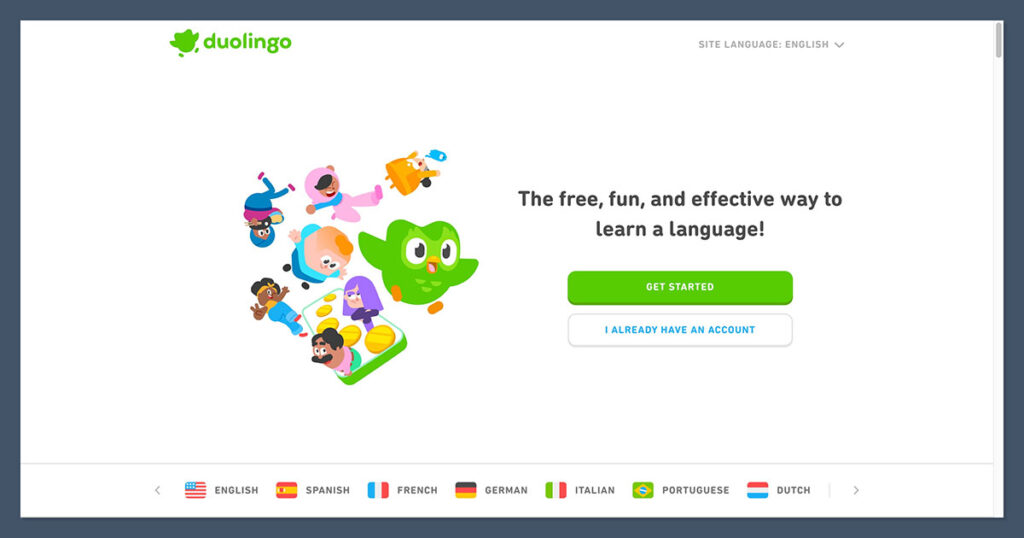
Duolingo Max adds AI chat and grammar explainers to its normal lessons.
Pros:
- Roleplay exercises
- Real-time grammar help
- Retains gamified learning approach
Cons:
- Expensive for casual learners
- AI responses can feel scripted
- Limited languages compared to regular Duolingo
Price: $29.99/month or $167.99/year
If you’re serious about learning a language and want more speaking practice, Max is worth it. It’s a big jump from the free version in both price and depth.
2. Learn.xyz
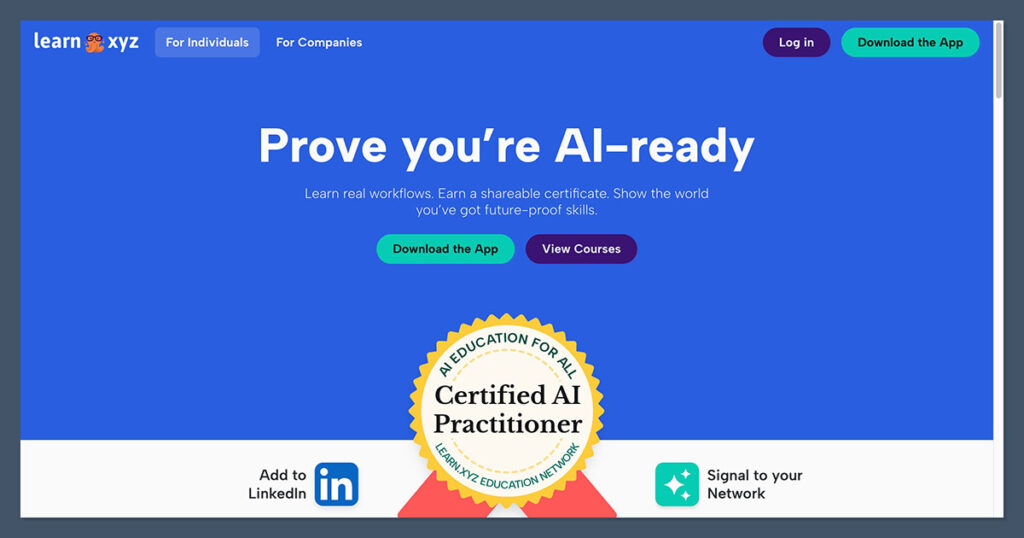
Learn.xyz uses visuals and AI explanations to teach complex subjects, including languages.
Pros:
- Interactive learning sessions
- Focus on core concepts
- Good for visual learners
Cons:
- Limited subject range right now
- Interface is geared toward younger users
- Less useful for advanced learners
Price: Free basic access; paid tiers available
Final thoughts:
If you’re new to a topic or want to make learning feel less dry, this tool is a good entry point. Simple but effective.
AI Tools for Research and Study Support
Cut down hours spent digging through papers. These tools help you summarize and organize research faster.
1. Perplexity AI
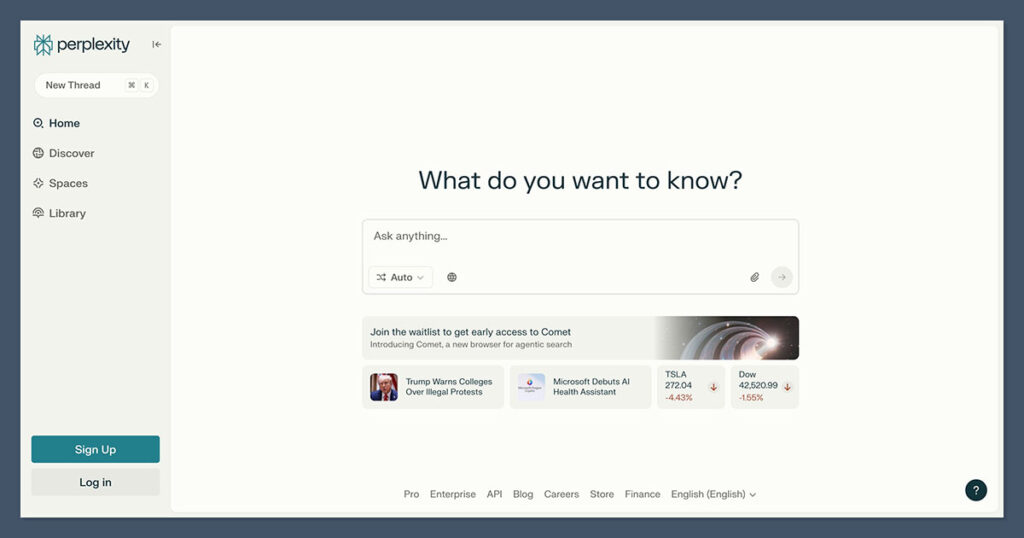
Perplexity gives fast answers with citations pulled from trusted sources.
Pros:
- Fast responses
- Real sources and citations
- Easy-to-use UI
Cons:
- Lacks depth on niche academic topics
- Some answers are oversimplified
- Premium features needed for longer context
Price: Free version available; Pro is $20/month
Perplexity is best when you need quick answers or an overview. It’s fast, accurate enough, and great for paper planning.
2. Elicit
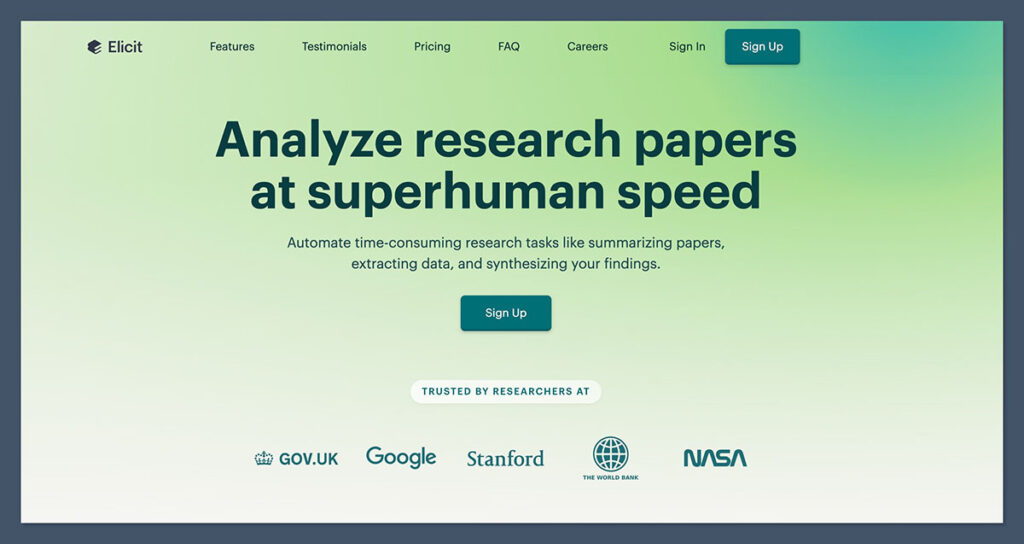
Elicit pulls academic research and highlights key findings.
Pros:
- Built for students and researchers
- Extracts insights from papers
- Helps frame research questions
Cons:
- Doesn’t always return full PDFs
- Some sources are outdated
- Still in beta, occasional bugs
Price: Free with premium options
Elicit helps you avoid getting overwhelmed when starting a paper. It simplifies the hardest part: finding the right sources.
3. Scite.ai
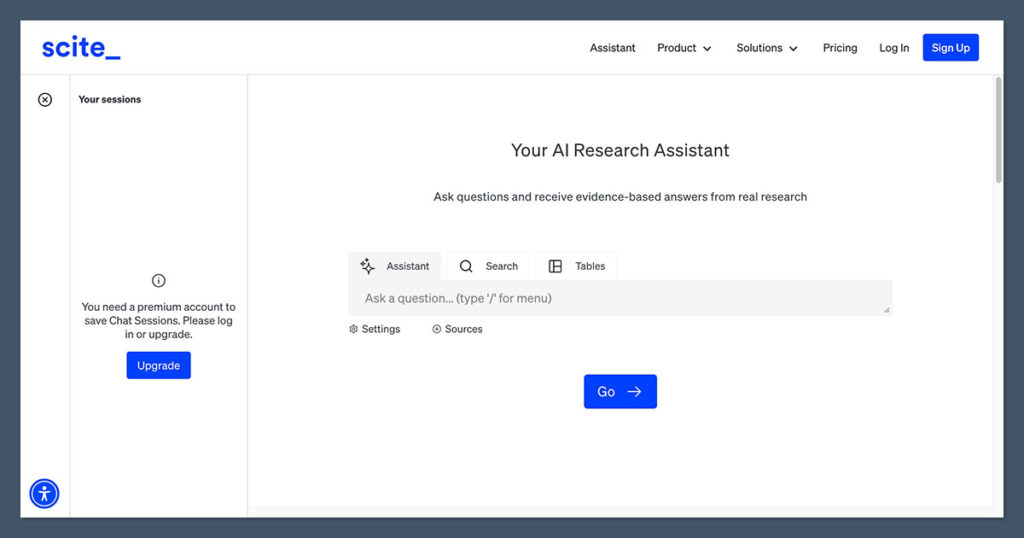
Scite maps out how research papers support or refute each other.
Pros:
- Tracks citation networks
- Analyzes paper credibility
- Visuals show how research connects
Cons:
- Not user-friendly for beginners
- Can feel technical without guidance
- Limited access without subscription
Price: Free basic access; Premium is $20/month
Scite is for serious academic work. If you’re writing a thesis or dissertation, this tool can give you a major edge in credibility.
AI Tools for Studying, Flashcards, and Exam Prep
When test season hits, these AI-powered tools help you prep more effectively and retain information longer.
1. Quizlet AI
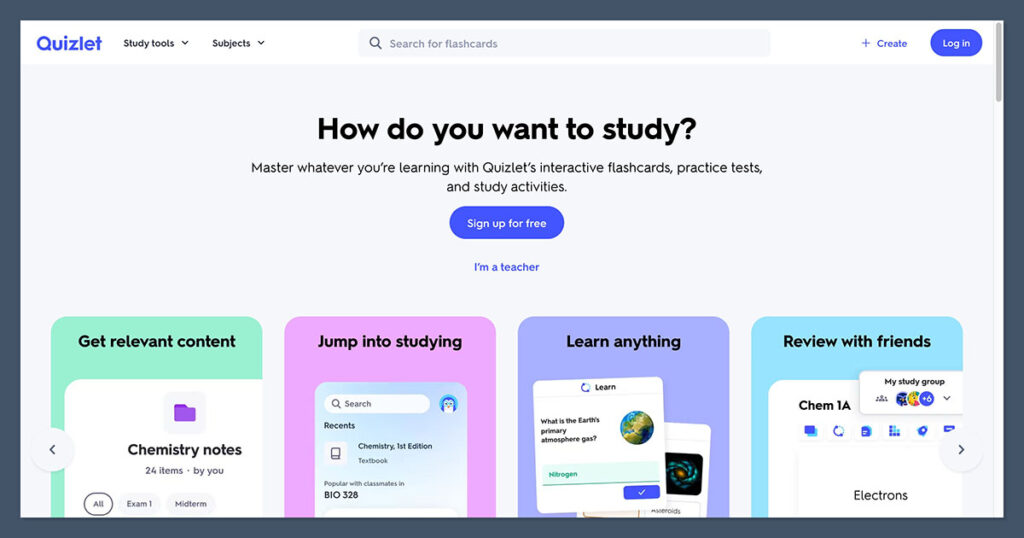
Quizlet’s new AI features like Magic Notes convert text into flashcards and quizzes.
Pros:
- Fast content-to-flashcard conversion
- Custom study paths
- Works with textbooks and notes
Cons:
- Magic Notes requires Plus plan
- Sometimes oversimplifies content
- Not ideal for very technical subjects
Price: Free base version; Plus is $35.99/year
Quizlet AI is great for prepping fast. If you’re short on time or hate writing your own cards, this tool handles the heavy lifting.
2. Anki with AI Plugins
Anki’s spaced repetition system becomes more powerful with AI-generated cards.
Pros:
- Retention-focused
- Full control over card content
- Plugins expand functionality
Cons:
- Steep learning curve
- Not as visually polished
- Requires setup and discipline
Price: Free core app; plugin pricing varies
If you’re in med school, law, or any heavy memorization subject, nothing beats Anki long term. It’s a bit nerdy, but it works.
AI Tools for Productivity and Focus
Studying is one thing — actually managing your time is another. These AI tools help you keep your focus and stick to a schedule.
1. Reclaim AI
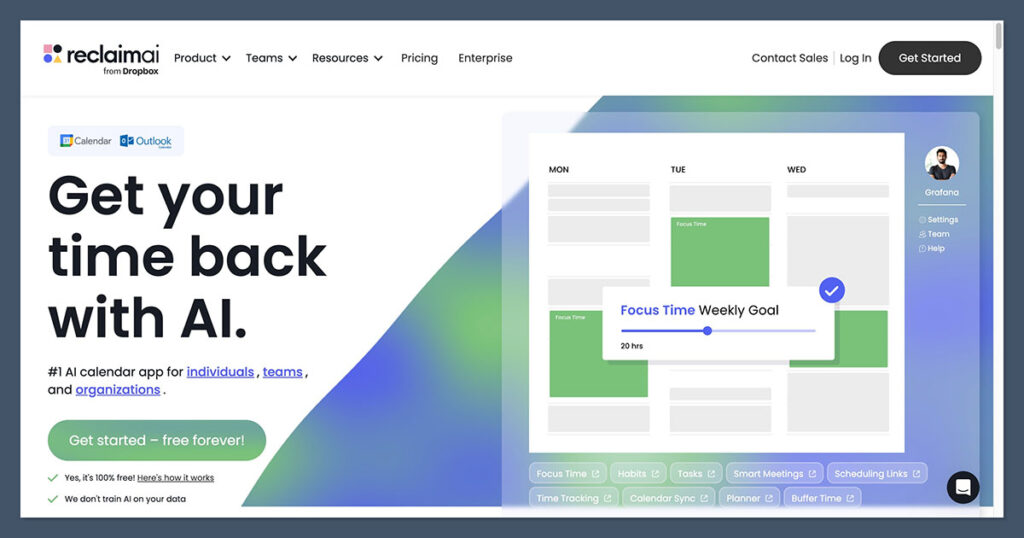
Reclaim auto-schedules your tasks, breaks, and study blocks around your real calendar.
Pros:
- Syncs with Google Calendar
- Dynamic rescheduling
- Focus time and personal task protection
Cons:
- Only works with Google Calendar
- Can be overwhelming for light users
- No mobile app
Price: Free basic plan; Premium is $10/month
Final thoughts:
Reclaim helps you actually make time to study. It’s a low-effort way to protect your focus time.
2. TimeHero

TimeHero creates smart daily schedules by estimating task time and deadlines.
Pros:
- Predicts how long tasks take
- Auto-schedules work around events
- Adjusts if plans change
Cons:
- Less intuitive interface
- Needs consistent task input to work well
- Can be buggy with recurring tasks
Price: Starts at $5/month
TimeHero is ideal if you’re balancing school, work, and personal projects. It gives structure without needing to micromanage everything.
Final Thoughts
The best part about AI tools for students? Most of them do more than just one thing. You can combine tools to build your own system — one that works for how you learn best.
Whether it’s using Otter.ai to record lectures, Grammarly to polish your essays, or Photomath to break down complex equations, you have options now that didn’t exist five years ago.
It’s not about replacing teachers or tutors. It’s about giving yourself backup — smart, fast, 24/7 backup — so you’re not stuck on your own.
These tools won’t make you a top student overnight, but they will save time, reduce stress, and help you study smarter. That’s a win in my book.
Quick Insights:
- Best for Math Help:
Socratic AI Math Helper for simplicity, Photomath for visuals, Mathway for advanced problems. - Best for Writing:
Grammarly and Quillbot for polishing; ChatGPT for structure and content generation. - Best for Note-Taking:
Otter.ai for lectures, Notion AI for structured notes, Mindgrasp for heavy content digestion. - Best for Language Learning:
Duolingo Max for immersive conversations; Learn.xyz for foundational understanding. - Best for Research:
Perplexity for quick insights, Elicit for peer-reviewed depth, Scite for credibility. - Best for Study & Prep:
Quizlet AI for fast flashcards, Anki for spaced repetition and retention. - Best for Time Management:
Reclaim for automated scheduling, TimeHero for task-based planning.
.
